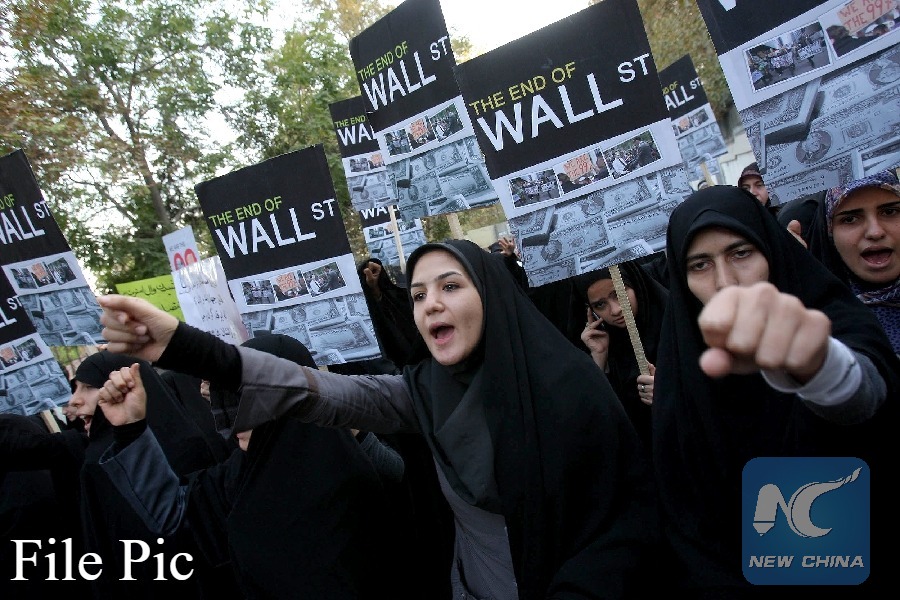
Students shout slogan during a gathering in support of U.S. Wall Street demonstrators outside the Swiss embassy which handles U.S. interests in Tehran, Iran, on Oct. 22, 2011. (Xinhua File photo)
BEIRUT, May 9 (Xinhua) -- While Lebanese analysts rule out the possibility of Iran waging a war against the United States as a result of the American sanctions, they expressed different views on how Tehran and its proxy Hezbollah will be impacted after the end of waivers and how they will react to them.
"Iran does not have the interest nor the capabilities to wage a war today," Sami Nader, director of Levant Institute for Strategic Affairs in Lebanon, told Xinhua, adding that Iran may wage violent acts against American interests across the globe.
Likewise, Rafik Nasrallah, a political analyst, said Iran may attack Americans in Afghanistan or in Iraq in reaction to the U.S. sanctions.
Youssef Diab, another political analyst, told Xinhua that Iran cannot start a war now because this will exacerbate its deteriorating economic crisis which could possibly lead to an internal revolution that may remove the whole regime in the country.
"Iran will probably end up holding negotiations with the U.S. based on conditions different than those agreed upon when Tehran signed a nuclear agreement with the U.S. and other countries," Diab said.
Iran's President Hassan Rouhani declared on Wednesday that the country would stop complying with two of its commitments under the Iranian nuclear deal exactly a year after U.S. President Donald Trump withdrew entirely from the 2015 agreement.
Rouhani's announcement also came after the Trump administration exerted further pressure against Tehran by refusing to extend the 180-day waivers for Iranian oil export which was first put in place last November.
Washington said it would place sanctions on any country that continues to buy Iranian oil after May 2.
While some analysts believe that countries must commit to U.S. decision of not importing oil from Iran, others believe that the U.S. cannot force such a decision on countries like Turkey, for instance.
"Turkey will not probably commit to this decision and they may keep buying oil from Iran," Nasrallah said.
Nasrallah noted that it will be obvious within the coming few weeks if the U.S. will truly take measures against any Iranian oil importing companies in Turkey.
Former Lebanese Ambassador to Iran Adnan Mansour reiterated Nasrallah's comments, saying that the U.S. cannot pressure Turkey to stop buying Iranian oil because these two countries have a trade volume valued at 15 billion U.S. dollars while it is expected to double in the coming period.
Mansour added that Tehran will find a way to export its oil.
However, even if Iran works on smuggling its oil out, it will only generate 1 percent of the revenues that it gained when it exported its oil legally, said Diab.
Companies that imported oil from Iran will stop because they are afraid of being targeted by the U.S. sanctions, Diab said, adding that "France's Total, for instance, has officially left Iran."
"Even Russia will not sacrifice its interests by importing oil from Iran, especially with the increased rivalry between the two countries over imposing their influence in Syria," he noted.
Rouhani announced that Tehran will increase its non-oil exports while continuing to sell oil in a bid to face the U.S. sanctions.
Iran also threatened to consider closing the Strait of Hormuz, the only sea route in and out of the Gulf, carrying a fifth of the world's traded oil.
Some of the analysts interviewed by Xinhua ruled out the possibility of Iran closing the Strait of Hormuz.
"Iran would be further damaging its economy if it closes this strategic waterway," Nasrallah said, adding that around 6,130 Iranian trade companies have businesses with companies in the United Arab Emirates.
However, Nader said that Iran may attempt to close Hormuz at least for some hours and days to create disturbances in the market.
Hezbollah, Iran's proxy in the region, will definitely be impacted by the U.S. sanctions against Iran, said Diab and Nader.
"Anything that affects Iran will surely have an impact on Hezbollah. When you cut Iran's resources, you are also depriving Hezbollah from resources," Nader said.
Diab reiterated Nader's comments by saying that Hezbollah Leader Sayyed Hassan Nasrallah has previously asked Hezbollah's supporters to donate funds to help the party face tighter sanctions from Western countries.
"Hezbollah has a lot of supporters. When Hezbollah leader asked his supporters for donations, he collected big amounts," Nasrallah added.

